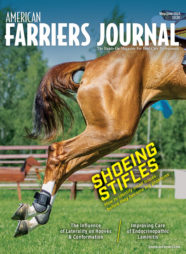The Morris Animal Foundation has received funding for three new pilot studies to combat equine parasites, to assess a new equine metabolic syndrome (EMS) test and to analyze the role of gut microbiomes in EMS. The grants total more than $30,000 and have been raised in addition to the other studies announced earlier this year.
The study analyzing the EMS test will be performed at Murdoch University in Australia. A laboratory test has been developed to improve the diagnosis of EMS by detecting serum paraoxonase-1 (PON1) activity. Dr. Gabriele Rossi will be spearheading the study. Previously, testing for EMS has been difficult due to seasonal changes and the time the horse last ate. Murdoch University hopes to use PON1 for more precise testing. Researchers received the best data when PON1 was measured immediately after collection. Hemoglobin affected the measurements, but lipids and bilirubin did not. There was also a significant pattern in high levels of PON1 during autumn. The funding awarded for this research is $9,355, reports the American Veterinary Medical Association.
The second study analyzes changes in microbiomes in Shetland ponies’ stomachs in relation to the development of EMS. If researchers can understand how EMS develops based on the role of gut bacteria, new opportunities might come about where EMS can be prevented instead of treated in the future. The researcher leading this study is Dr. Mathijs J.P. Theelen. The study will be conducted at Utrecht University in the Netherlands. The funding awarded for this research project is $10,800.
The Morris Animal Foundation was founded in 1948 by a veterinarian and was created to bring science and resources together to better the health of animals. Each study will last one year, and each aims to accelerate the scientific discovery process through research.







Post a comment
Report Abusive Comment